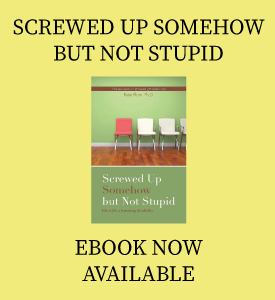For a teacher, a child with nonverbal learning disability can be a puzzle. I am sure I was a puzzle to my teachers! Here are some things I wish they had known:
 1. Just because I’m disabled doesn’t mean I’m not abled. There are things I can do badly, there are things I can do well and there are some things I can’t do at all. The fact that some of the things I can’t do at all are easy for most kids, doesn’t mean that some of things I can do well aren’t hard for most kids. If you help me use what I am good at to do what I am bad at, things will go more smoothly for both of us.
1. Just because I’m disabled doesn’t mean I’m not abled. There are things I can do badly, there are things I can do well and there are some things I can’t do at all. The fact that some of the things I can’t do at all are easy for most kids, doesn’t mean that some of things I can do well aren’t hard for most kids. If you help me use what I am good at to do what I am bad at, things will go more smoothly for both of us.
2. I often need instructions in a different way; that doesn’t mean I can’t learn. Some kids learn better by listening, some by reading, some by watching someone do something. Don’t assume that I am not interested in learning just because your instructions didn’t seem to take; I might need them in a different format. Once I’ve figured out the instructions, I can learn a lot of things. and isn’t that what school should be all about?
3. You can ask me questions. If you notice that I’m not doing what you think I should be doing, or not learning the way you think I should be learning, ask me about it. I might have an answer! I’ve been this way all my life, and I’ve come up with some ideas. Or we might come up with something together. Then I can annoy you less.
4. Just because I’m not doing something doesn’t mean I’m being lazy. I may have more trouble figuring out what needs doing, especially in unstructured work. I may get overwhelmed when a lot of kids are doing different things at once. I might react by shutting down, or just sitting at my desk; or, being a kid, I might react by having a tantrum or being oppositional. If I am overwhelmed, I won’t be able to work well (and what overwhelms me might not be what overwhelms other kids).
5. If I seem confused, I probably am. That doesn’t mean I’m stupid or incapable, it just means I haven’t understood something. What’s clear to you may not be clear to me. Almost no one likes to appear confused or foolish, so it’s very unlikely to be an act.
6. Specificity often helps. If you see me not performing properly, you might need to be more specific in what you want me to do.
7. I don’t read body language well. Pretend I’m blind, if that helps. Or pretend you are writing to me rather than speaking. Would you give instructions differently? Then you’ll be clearer to me, and I can learn and you can teach.
8. On the other hand, labels on things do help. Because I don’t remember where things are. Expecting me to remember where everything is won’t work, but labels usually will. Then you can spend less time telling me where things are, and more time doing your job.
9. Everybody doesn’t know what you think everybody knows. I (that’s me personally, this time) don’t know how to whistle, strike a match, make a bed or fold a bag. But I can solve quadratic equations and do factor analysis. Let me do what I do well, and I will do it well. And then you can do what you do well, too.
10. If I ask for some kind of accommodation, I probably need it. The typical school accommodation, though, may not be right for me. For me (again me personally) extra time would have been no help at all – I was always done first!



Thank you for this. Someone gets it. Living with this disability is very tough. I like the blind concept, that should help people understand.
Suggestion for number eleven: I have a disability, but I’m a human being with feelings first. I know I’m frustrating to work with, but that’s not an excuse to be unprofessional or make assumptions. I will remember every negative thing you say to me.
I have a lot of emotional scars, most of them from teachers and other authority figures who blamed me for my own failure, assumed I wasn’t trying hard enough, and questioned my motivation level in a far less than professional manner and never saw consequences for it.